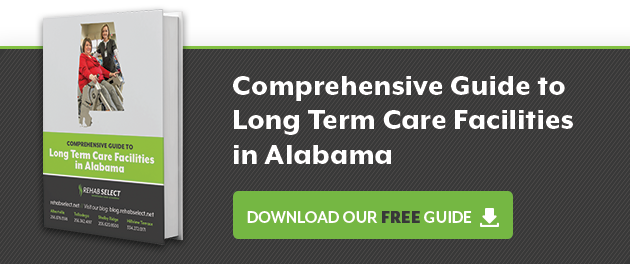 When the need for long term care arises, the process of planning that care can be a long, confusing and stressful one. The stakes are high, whether you're planning care for yourself or have taken on the responsibility of choosing care for a loved one. So how to ensure that you've covered all the bases in evaluating facilities in your area? The Alabama Long Term Care Ombudsman program can be a valuable resource for people who are working to choose the right Birmingham long-term care facility, and here we'll go over important questions to ask when you contact them.
When the need for long term care arises, the process of planning that care can be a long, confusing and stressful one. The stakes are high, whether you're planning care for yourself or have taken on the responsibility of choosing care for a loved one. So how to ensure that you've covered all the bases in evaluating facilities in your area? The Alabama Long Term Care Ombudsman program can be a valuable resource for people who are working to choose the right Birmingham long-term care facility, and here we'll go over important questions to ask when you contact them.
About the Alabama Long Term Care Ombudsman Program
Administered by the Alabama Department of Senior Services, the Alabama Long Term Care Ombudsman program works to provide services that protect residents of long term care facilities in the state, including nursing facilities, assisted living facilities, specialty care facilities and boarding homes. Ombudsmen serve as advocates for those residents, as well as their friends and families, protecting residents' safety, health, welfare and rights.
As a function of serving in this capacity, the program investigates and/or keeps records of resident complaints, concerns and problems, facility licensing surveys, state inspection reports and many other factors that may potentially affect the health, safety and care of facility residents. This program also shares relevant information with individuals who have questions about specific facilities, including those who are in the midst of choosing a long term care facility for their care needs.
Questions to Ask the Ombudsman
Knowing the right questions to ask when you contact the Ombudsman's office is essential for getting the information you need to evaluate the quality of care you can expect to receive from a specific long term care facility. Among the most important of these are:
-
Is the facility licensed? If so, does it hold a regular license or a probationary one? A probationary license can indicate that the facility is not or has not been in compliance with State Board of Health requirements and holds a probationary status until deficiencies are corrected.
-
How many complaints have been registered by the program concerning this facility? Have the underlying issues behind these complains been resolved, and if so, what corrective measures were taken? While no facility is perfect, a long list of complaints as compared to other Birmingham facilities – especially unresolved ones – can be a sign of less then stellar care quality.
-
Has the facility been cited and/or fined for health and safety violations? If so, how many violations, what are the details, and have these issues been shown to be resolved in subsequent inspections? Again, no facility is perfect, but one that has significantly more violations than others in the area may be a source of concern.
-
How willing is the facility to work with the ombudsman program? If the long term care facility you are researching welcomes visits/investigations from the local ombudsman, this can be a sign of a reputable facility that strives to provide quality care to residents.
Lastly, ask for the program's general impression of the facility, as well as information on its reputation among residents, families, staff and the community. Taking these steps for each of the facilities you consider for your care can provide you with a great deal of insight as you evaluate and compare long-term care options, making it easier to feel confident in your ability to choose wisely.





